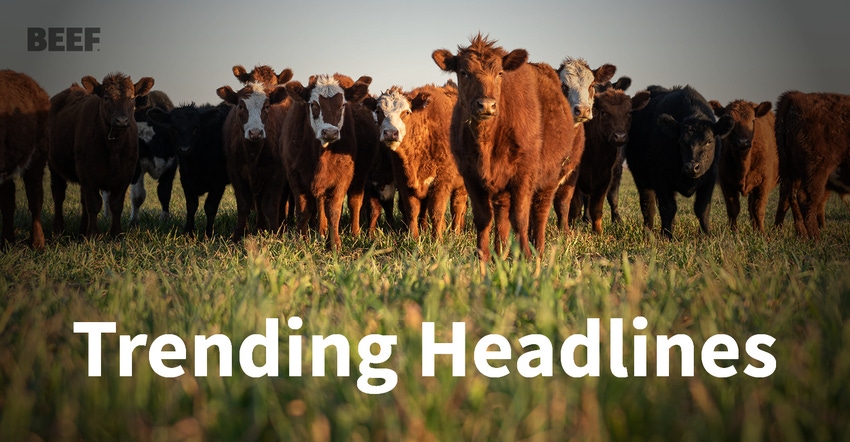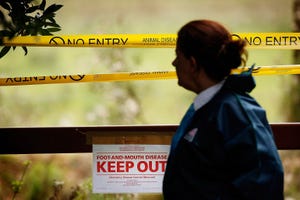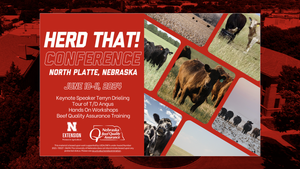5 Trending headlines in the world 0
Check out these stories to find out what is happening in the BEEF world.

1. The invasion of Russia into Ukraine continues to wreak havoc on farmers—both in Ukraine and here in the United States. Diesel fuel prices are at about $5 a gallon here in the United States and over $4 a gallon for gasoline.
However, Ukraine farmers have run out of fuel and are pushing the ag sector towards collapse. If it does not secure diesel soon, Europe could face massive price spikes for agricultural commodities and challenging food shortages.
As has been widely reported, Ukraine is a major agricultural powerhouse. Between 2018 and 2020, it produced 49.6% of global sunflower oil, 10% of global wheat, 12.6% of global barley, and 15.3% of global maize. Ukraine is also a top producer of eggs, potatoes, rye, other grains, and even cheese.
2. From Reuters today: Canada has approved the importation of beef and pork from Brazil, which had been blocked over health concerns, authorities from both countries said on Monday.
"We are in Ottawa and have just left the Canadian Ministry of Agriculture with ... great news: the opening up of the country's pork and beef market," Brazilian Agriculture Minister Tereza Cristina Dias tweeted.
Asked for comment, the Canadian Food Inspection Agency told Reuters it "approved the import of raw and cooked poultry meat, pork and pH matured beef from Brazil" last Friday.
Dias, who traveled to Canada to speak with potash companies and other suppliers of fertilizers said Brazilian meatpackers will now be able to export products to more than 200 markets around the world, which was her goal when she took over the ministry more than three years ago.
3. From the site, Science News, a study out of Cornell University says heat stress for cattle may cost billions by century’s end. Climate change poses a potentially desvastating economic threat to low-income cattle farmers in poor countries due to increasing heat stress ont eh animals. Globally, by the end of this century, those producers may face financial loss between $15 and $40 billion annually.
Farmers in tropical regions -- including large parts of South America, Asia and Africa -- are likely to suffer significantly, particularly when compared with producers in the world's wealthier temperate zones, according to a study by an international team of scientists and economists published in the Lancet Planetary Health.
The researchers, including Mario Herrero, professor of sustainable food systems at Cornell University, and lead author Philip Thornton, of the International Livestock Research Institute and CGIAR; published "Impacts of Heat Stress on Global Cattle Production During the 21st Century."
Escalating demand for livestock products in low- and middle-income countries, along with steadily increasing global average temperatures, is an uncomfortable mix, the researchers said. If livestock are to adapt to new thermal environments and increase their productivity, infrastructural investments or adjustments -- such as switching to more heat-tolerant cattle breeds, and improving shade, ventilation and cooling systems -- will be required.
4. Congressional members call for WOTUS pause. From Farm Progress: As the Supreme Court looks to hear a crucial wetlands case later this year, over 200 House members called on the Biden administration to drop its current rulemaking to revise the definition of the “Waters of the United States.”
For almost two decades, rural communities, businesses and industries who rely on clean water have been trapped in “political and legal limbo,” according to a letter signed by 201 House members including House Republican Leader Kevin McCarthy, R-Calif., House Republican Whip Steve Scalise, R-La., House Republican Conference Chair Elise Stefanik, R-N.Y., Congressional Western Caucus Chairman Dan Newhouse, R-Wash., and the entire Western Caucus membership. The letter details why the Environmental Protection Agency and Army Corps of Engineers should not move forward in their plans to replace the Trump-era navigable waters rule. To get more details on the WOTUS pause, check out the story here.
5. Cattle help rejuvenate Sterling Wildlife Management Area in Idaho.
Dallin and Chase Carter and ranch-hand Cole Lewis mount their horses and gather 400 cattle to drive them to another grazing area in the Sterling WMA. Chase Carter rides alongside the cattle in adjoining farm fields, making sure the cows stay on the road. After traveling about a mile, the ranchers herd the cattle into the next pasture and the cows begin grazing.
Maria Pacioretty is the habitat biologist at Sterling WMA for the Idaho Department of Fish and Game. She’s been searching for answers on how to deal with a heavy overburden of dead cattails and bulrushes that have been accumulating in the Sterling WMA.
“We have a biomass problem, where we have acres and acres of decadent vegetation and accumulated growth on the ground,” Pacioretty says. “It’s really thick, almost impenetrable, so it makes it really difficult for wildlife and people who want to use the WMA whether it’s hunting or hiking.
The Sterling WMA encompasses 4,100 acres on the west shore of American Falls Reservoir. It provides habitat for breeding and migrating waterfowl.
Pacioretty did a lot of research on how to fix the problem. The overload of vegetation reduces the overall productivity of the wetland.
“We started thinking about unique ways to attack this problem,” she says. “So we got in touch with some local ranchers and started working up a plan: How could we use cattle to maybe help break this up, open these areas back up so we can have some rejuvenation of the vegetation here?”
Cattle grazing occurs in the winter so it doesn’t conflict with other uses. The Carters are using herding and solar hot-wire fencing to focus the cattle on specific areas that need attention. To get more details on the project, check out the story.
And a bonus for this week. The Ohio Beef Expo takes over the city of Columbus this weekend with plenty of junior shows along with seedstock shows and sales.
About the Author(s)
You May Also Like


.png?width=300&auto=webp&quality=80&disable=upscale)
